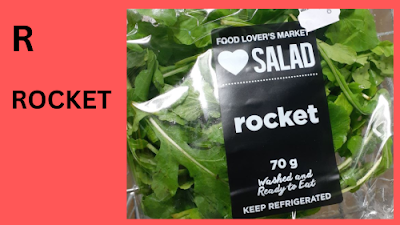6 Health Benefits of Eating Rockets.
Six Health Benefits of Eating Rocket Leaves.
The post introduces Garden Rocket, a leaf vegetable in the Brassica family and describes its enormous nutritional contents and excellent health benefits.
No wonder I can imagine what is passing through your mind; it is not that one whooshing into outer space but on your salad plate, in your area, the garden rocket. The first time I heard it, I thought I heard it all wrong until I saw it on the supermarket shelf and read the label.
It is Arugula in US English and Rocket in UK English, a leafy salad vegetable with a fresh, bitter, and peppery flavour. Its common name is a garden rocket, which tastes like mustard leaves, watercress, and radish.
The plant has a Mediterranean origin, known as 'Gargeer' in India. The plant features dandelion-like succulent, elongated, lobular leaves and is in the Brassicaceae family.
The leafy vegetable is available in South Africa in all supermarkets and grocery shops, planted in home gardens or commercially. The leaves are added to green salads. Fresh leaves add a peppery touch to rice, pasta, scrambled eggs, and omelettes. Also, added to pasta, soups, curries, and sautéed leaves are used to top pizza or baked potatoes.
A cup of rocket leaves contains the following nutrients:
Protein, lipid fat, carbohydrate, energy, sugars, dietary fibres, calcium, magnesium, phosphorous, potassium, sodium, zinc, copper, manganese, selenium, vitamin A, vitamin E, vitamin C, thiamin, riboflavin, niacin, pantothenic acid, vitamin B6, folate, vitamin B-16, vitamin k, folic acid, folate, and more Those interested to know their measurements, please refer to the link above.
Health benefits of rocket leaves.
1 Low calories.
Rocket leaves have low calories, just 25 calories in 100 grams of fresh leaves. Beyond the other nutrients, it contains phytochemicals, antioxidants, vitamins and minerals, essentials for a healthy body.
2 ORAC capacity.
Rocket leaves have the ORAC, oxygen radical absorbance capacity (a measure of antioxidant strength) of about 1904µ mol per one hundred grams.
3 Protection against cancers.
A member of the Brassica family, the leaves are rich in phytochemicals. They have been found to counter the carcinogenetic effect of estrogen, which may offer protection against prostate, breast, cervical, colon, and ovarian cancers by their cancer cell growth inhibition.
4 Good for anticipant mothers.
Fresh rocket leaves are rich in folates. Eaten by anticipant mothers during conception time, folates may help prevent neural tube defects in newborns.
5 Protect skin and lung cancers.
Like Kale, salad rocket is an excellent source of vitamin A. Studies show that vitamin A and flavonoid compounds in green leafy vegetables help protect the skin, lungs, and oral cavity cancers.
6 Help the formation and strengthen bones.
Being an excellent source of vitamin K, rocket leaves play a potential role in bone formation and strengthening.
Conclusion.
The post introduces Garden Rocket, a leaf vegetable in the Brassica family and describes its enormous nutritional contents and excellent health benefits.
Have you heard of Garden Rockets, a wonder green and use them?



Your article on the six health benefits of eating rocket leaves, arugula, and brassica was a fantastic read! Your in-depth analysis of each benefit and how these greens can improve overall health was enlightening. Keep up the excellent work in promoting healthy living!
ReplyDeleteThank you, Mondidipa, for reading my post, highlighting the benefits, and listing them. I am happy that they inform my readers and help me learn about them.
Delete